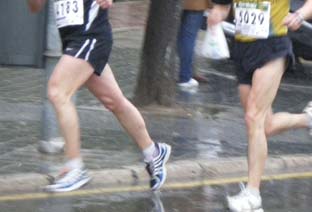
Evaluating, on the one hand, the utility of virtual reality to induce a certain mood on kids and adolescents while they practice physical activity and measure, on the other hand, their emotion while watching advertisements on food products. These are the objectives of the studies which are being developed by researches from the group Labpsitec, from the University of Valencia, and of Jaume I from Castellon and by LabHuman, from the Universitat Politècnica de Valencia.
During this month, researchers from LabHuman and Labpsitec have carried out a series of tests with 40 participants from the Summer School in the Universitat Politècnica de Valencia, aged between 9 and 12.
The objective of the first study, directed by the group Labpsitec (UV-UJI), consisted on researching on the effect on children to complete a race in which they always win and another one in which they always lose. In order to do so, the researchers from LabHuman at the UPV developed a virtual reality that allows generating these effects.
The main aim is to study the effect of this difference on the subjective experience of exhaustion and the taste perceived by the child on the physical activity. As highlighted by the researchers, this will allow observing the effect that social comparison or unfitness can have on the motivation for the development of a physical activity.
“The results indicate that losing a race despite making an effort affects negative emotions, increases their subjective perception of exhaustion and lowers the taste on the physical activity and its execution. However, winning increases self-efficiency (believe in the capacity of properly executing a physical activity) and positive emotions. These results confirm the potential of virtual reality and active video games to promote positive emotions and taste on physical activity among children with sedentary lifestyles”, added Ausias Cebolla, professor at the UJI.
This study is framed in the project Actiobe and CIBERobn (excellency group on obesity researches) guided by the full university professor on Psychology at the University of Valencia Rosa Maria Baños and professor Ausias Cebolla from the UJI.
Advertisements’ impact on food and physical exercise
The second of the studies, directed by the UPV, is framed within the research line of Labhuman, centered around the evaluation of the media contents’ impact on the audience. In this case, the aim was to study the impact on behavior and the emotions experimented by the kids while they watch food advertisements to determine if there are differences among those who follow a more balanced diet and those who do not.
“We wanted to analyze the reasons why healthy food campaigns do not manage to make a real impact on the child. We try to understand the answer to this publicity campaigns to analyze who a bigger impact could be accomplished on the child so he can be motivated to change his eating habits. Developing studies like this one will allow designing future health campaings in a much more effective way for children”, explained the Doctor in Biomedical Engineering Jaime Guizeres, scientific coordinator of LabHuman in the UPV.
In order to carry out this study, the researcher monitors the cardiac activity, face gestures, and the eye’s movement using a portable non-invasive commercial system, with the objective of measuring the reaction in front of different adverts.
As highlighted by researchers from the UPV, the preliminary results obtained to the moment show that our visual attention patterns to home-cooked food adverts and to fast food ones show differences depending on the kid’s type of diet.
“We are also finding that the frames within each advert show a bigger emotional impact on the children are different in those who maintain a healthy diet and those who do not” added Jose Manuel Ausin and Juan Carlos Rojas, researchers from the Labhuman-UPV.
Last update: 31 de july de 2014 11:00.
News release



















